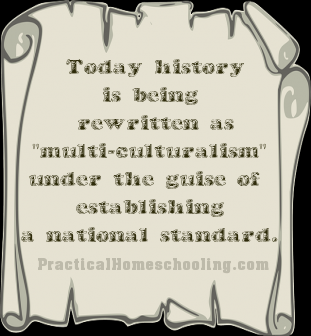 History consists of all the lives and events that have happened before
we were born. Since we cannot study all that, we must selectively pick
only the most important people and events to study—people and events
that affected the course of history.
History consists of all the lives and events that have happened before
we were born. Since we cannot study all that, we must selectively pick
only the most important people and events to study—people and events
that affected the course of history.
Historians have always faced the dilemma of what to record and what not
to record. Certainly, other men besides Alexander Graham Bell were
simultaneously working on the telephone. But history only remembers
Bell, because he was the first to discover the telephone.
Not every inventor makes it into the history books. My grandfather had
many inventions patented, but you will not find schoolchildren
memorizing his name and date of birth. No doubt his self-tightening
clothesline was a welcomed convenience to many women; however, the
advent of the electric dryer instantly antiquated it. Plus a
self-tightening clothesline, though useful, did not change the course of
history.
Today history is being rewritten under the guise of establishing a
“national standard” for history. When Goals 2000 was signed into law by
Bill Clinton in March 1994, its stated purpose was to establish a
“world-class standard” for all core subjects and develop a national
examination to determine whether American students are meeting those
standards. In short, this law nationalized education. A national test
means a national curriculum. But before the curriculum can be changed,
the standards for each subject must be changed.
History’s New Purpose:
Self-Identity Through Racial Quotas
The National Standards for United States History was released late last
year. Two years in the writing by history teachers, historians,
representatives of professional and scholarly organizations, as well as
civic and public interest groups, this 260-page document is a
politically correct rewrite of U.S. history. It claims “Historical
memory is the key to self-identity . . . and one’s connectedness to all
humankind . . . Denied knowledge of one’s roots and of one’s place in
the great stream of human history, the individual is deprived of the
fullest sense of self.”
True, understanding history gives breadth to our knowledge and
perspective; however, these revisionist have championed the cause of
“connectedness to roots” to the exclusion of recording the most
important, noteworthy historical events. They have taken to recording
history along an ethnic quota system. For example, students are asked,
- “How did Native American societies such as the Pueblos, Catawbas,
Iroquois, and Lenni Lenape respond to European land hunger and
expansion?”
- “Analyze Pontiac’s speech to the French on the reasons for making
war . . . compare reasons to Opechaneanough . . . and King Philip.”
While Pontiac’s speech may be enlightening, it did not affect the course
of history as did Thomas Paine’s “Crisis Papers,” George Washington’s
“Farewell Address,” or Patrick Henry’s famous “Give me liberty or give
me death” speech, none of which are mentioned in these “standards,” much
less analyzed.
“Self-identity” for African Americans via knowing one’s roots amounts to
African, not U.S., history. Students are to locate the “political
kingdoms of Mali, Songhi, and Benin,” draw on stories of Moslem Mansa
Musa and his great pilgrimage to Mecca in 1324, and read “historical
narratives of Muslim scholars such as Ibn Fadi Allah al-Omari.”
Perhaps this African history is balanced equally with European-American
history in the minds of the revisionist by recommending readings of
William Bradford’s Of Plymouth Plantation, John Winthrop’s “A Model of
Christian Charity,” and Jonathan Edwards’ “Sinners in the Hands of an
Angry God.” But ask if these Moslem texts pass the “self-tightening
clothesline test.” Did they shape American history? Slaves brought to
America did not influence the American religious scene by practicing the
Moslem religion; however, Christianity is the very foundation of our
nation and its form of government.
Politically Correct Agendas Replace True History
These standards clearly advance agendas by the number of times certain
issues are discussed and by the biased wording of questions.
Environmentalism, separation of church and state, anti-religion,
homosexual rights, and women’s rights are just a few of the agendas. One
example: students are to “debate on the long-term effects of the fur
trade, considering . . . its destruction of animal life; its disruption
of traditional Native American relationships with the environment.” Take
that, Kit Carson!
Feminism abounds, with questions like “Why were women much more likely
than men to be accused of witchcraft during the 17th century? Why . . .
[was] honor viewed as strictly a male attribute and shame viewed as
intrinsic to women?”
The skewing of history is most evident in the treatment of George
Washington. He is mentioned only twice, once in a cursory list and once
in a non-historical situation as follows:
“Construct a dialogue between an Indian leader and George Washington at
the end of the war regarding how a long-standing conflict between their
peoples might be resolved.”
World Book Encyclopedia has 19½ pages on George Washington. This is a
reasonable measure of his historic importance. It only has two
paragraphs on Mercy Otis Warren, a white Revolutionary War woman, and
only three paragraphs on Phyllis Wheatly, a black American poet—which
might actually be overinflating their historical importance. Yet the new
“standards” instruct students to construct biographies of the two women
and not our first president! But then our first president committed a
politically incorrect sin. He was a man!
History is being rewritten by omitting fact, events, and people that
molded America and by multi-cultural babble which promotes agendas and
fragments individuals into racial groups, each warring for a piece of
the historical pie without any regard for the facts of history. If these
standards bring about a national curriculum, it is possible that in the
next generation homeschoolers who refuse to teach to these biased
standards might be the only ones who truly know history.